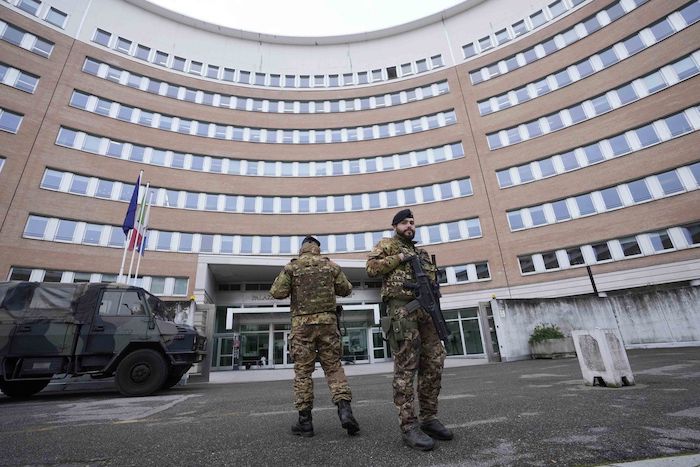Crime
Italy court weighs handover in EU Parliament corruption case

By Colleen Barry And Lorne Cook in Brescia
BRESCIA, Italy (AP) — An Italian court on Monday was deciding whether to hand over to Belgium a suspect in a big corruption scandal at the European Parliament, in which Belgian prosecutors suspect the wife and daughter of a former lawmaker of being part of a criminal gang trying to influence EU legislators on behalf of Qatar and Morocco.
According to arrest warrants seen Monday by The Associated Press, former EU lawmaker Pier Antonio Panzeri and three other suspects were charged on Dec. 9 with corruption, participation in a criminal group and money laundering. Belgian prosecutors suspect that they “were paid large sums of money or offered substantial gifts to influence parliament’s decisions.”
The investigation of allegations of cash and gifts for political influence corruption is one of the biggest to hit the European Parliament. Lawmakers last week suspended work on Qatar-related files and vowed to toughen lobbying laws. Qatar vehemently denies that it is involved.
According to the two European arrest warrants issued by Belgian judge Michel Claise, Panzeri is “suspected of intervening politically with members working at the European Parliament for the benefit of Qatar and Morocco, against payment.”
Panzeri’s wife, Maria Dolores Colleoni, and their daughter, Silvia Panzeri, are suspected of being “fully aware” of his activities and even to help transport “gifts” given by Morocco’s ambassador to Poland, Abderrahim Atmoun.
Prosecutors in Belgium are seeking their transfer to Belgium to face the same charges as the other four suspects, who include a former EU parliament vice president and her Italian partner. They face up to five years in prison if found guilty, according to the warrants.
A hearing was under way Monday in Brescia on whether to hand over Colleoni, while her daughter’s case will be heard separately on Tuesday. They are both under house arrest near Brescia, though Colleoni was in court on Monday. Panzeri himself is detained in Belgium.
Colleoni’s lawyer, Angelo de Riso, said handing her to Belgian authorities would violate her human rights because an Italian court has already conceded house arrest and a transfer to Belgium would land her in jail pending charges and trial.
A former vice president of the European Parliament, Eva Kaili, remains in custody in Belgium awaiting a hearing on Thursday. Her term in office was terminated by EU lawmakers last week. Her partner, Francesco Giorgi, was a parliamentary advisor.
Besides Panzeri, who leads the Fight Impunity campaign group, Niccolo Figa-Talamanca, secretary-general of the non-governmental organization No Peace Without Justice, was also charged. He has been released from prison but remains under surveillance and must wear an electronic monitoring bracelet.
Separately Monday, the former head of the Italian parliamentary committee on intelligence on Monday told reporters that a report on Qatar had been prepared and unanimously approved in August. The report has been classified and sealed, according to Adolfo Urso, now a minister in Premier Giorgia Meloni’s government. The report also includes China and Russia.
___
Cook reported from Brussels.
Addictions
Why can’t we just say no?

From the Frontier Centre for Public Policy
Drug use and violence have become common place in hospitals. Drug-addicted patients openly smoke meth and fentanyl, and inject heroin. Dealers traffic illicit drugs. Nurses are harassed, forced to work amidst the toxic fumes from drugs and can’t confiscate weapons. In short, according to one nurse, “We’ve absolutely lost control.”
“Defining deviancy down” is a cultural philosophy that emerged in the United States during the 1990s.
It refers to society’s tendency to adjust its standards of deviancy “down,” so that behaviours which were once unacceptable become acceptable. Over time, this newly- acceptable behaviour can even become society’s norm.
Of course, the converse must also be true — society looks down on those who label social behaviours “wrong,” deeming them moralistic, judgemental or simply out of touch with the realities of modern life.
Thirty years later, this philosophy is entrenched in British Columbia politics and policies. The province has become a society that cannot say “no” to harmful or wrong behaviours related to drug use. It doesn’t matter if you view drug use as a medical issue, a law-and-order issue, or both – we have lost the ability to simply say “no” to harmful or wrong behaviour.
That much has become abundantly clear over the past two weeks as evidence mounts that BC’s experiment with decriminalization and safe supply of hard drugs is only making things worse.
A recently-leaked memo from BC’s Northern Health Authority shows the deleterious impact these measures have had on BC’s hospitals.
The memo instructs staff at the region’s hospitals to tolerate and not intervene with illegal drug use by patients. Apparently, staff should not be taking away any drugs or personal items like a knife or other weapons under four inches long. Staff cannot restrict visitors even if they are openly bringing illicit drugs into the hospital and conducting their drug transactions in the hallways.
The public was quite rightly outraged at the news and BC’s Health Minister Adrian Dix quickly attempted to contain the mess by saying that the memo was outdated and poorly worded.
But his facile excuses were quickly exposed by publication of the very clearly worded memo and by nurses from across the province who came forward to tell their stories of what is really happening in our hospitals.
The President of the BC Nurses Union, Adriane Gear, said the issue was “widespread” and “of significant magnitude.” She commented that the problems in hospitals spiked once the province decriminalized drugs. In a telling quote, she said, “Before there would be behaviours that just wouldn’t be tolerated, whereas now, because of decriminalization, it is being tolerated.”
Other nurses said the problem wasn’t limited to the Northern Health Authority. They came forward (both anonymously and openly) to say that drug use and violence have become common place in hospitals. Drug-addicted patients openly smoke meth and fentanyl, and inject heroin. Dealers traffic illicit drugs. Nurses are harassed, forced to work amidst the toxic fumes from drugs and can’t confiscate weapons. In short, according to one nurse, “We’ve absolutely lost control.”
People think that drug policies have no impact on those outside of drug circles – but what about those who have to share a room with a drug-smoking patient?
No wonder healthcare workers are demoralized and leaving in droves. Maybe it isn’t just related to the chaos of Covid.
The shibboleth of decriminalization faced further damage when Fiona Wilson, the deputy chief of Vancouver’s Police Department, testified before a federal Parliamentary committee to say that the policy has been a failure. There have been more negative impacts than positive, and no decreases in overdose deaths or the overdose rate. (If such data emerged from any other healthcare experiment, it would immediately be shut down).
Wison also confirmed that safe supply drugs are being re-directed to illegal markets and now account for 50% of safe supply drugs that are seized. Her words echoed those of BC’s nurses when she told the committee that the police, “have absolutely no authority to address the problem of drug use.”
Once Premier David Eby and Health Minister Adrian Dix stopped denying that drug use was occurring in hospitals, they continued their laissez-faire approach to illegal drugs with a plan to create “safe consumption sites” at hospitals. When that lacked public appeal, Mr. Dix said the province would establish a task force to study the issue.
What exactly needs to be studied?
The NDP government appears to be uninformed, at best, and dishonest, at worst. It has backed itself into a corner and is now taking frantic and even ludicrous steps to legitimize its experimental policy of decriminalization. The realities that show it is not working and is creating harm towards others and toward institutions that should be a haven for healing.
How quickly we have become a society that lacks the moral will – and the moral credibility – to just to say “no.”
Susan Martinuk is a Senior Fellow with the Frontier Centre for Public Policy and author of Patients at Risk: Exposing Canada’s Health-care Crisis.
Alberta
Former senior financial advisor charged with embezzling millions from Red Deer area residents

News release from Alberta RCMP
Former senior financial advisor charged for misappropriating nearly $5 million from clients
On April 4, 2024, the RCMP’s Provincial Financial Crime Team charged a Calgary resident for fraud-related offences after embezzling millions of dollars from his clients while serving as a senior financial advisor.
Following a thorough investigation, the accused is alleged to have fraudulently withdrawn funds from client accounts and deposited them into bank accounts he personally controlled. A total of sixteen victims were identified in the Red Deer area and suffered a combined loss of nearly $5 million.
Marc St. Pierre, 52, a resident of Calgary, was arrested and charged with:
- Fraud over $5,000 contrary to section 380(1)(a) of the Criminal Code; and,
- Theft over $5,000 contrary to section 344(a) of the Criminal Code.
St. Pierre is scheduled to appear in Red Deer Provincial Court on May 14, 2024.
“The ability for financial advisors to leverage their position to conduct frauds and investment scams represents a significant risk to the integrity of Alberta’s financial institutions. The investigation serves as an important reminder for all banking clients to regularly check their accounts for any suspicious activity and to report it to their bank’s fraud prevention team.”
- Sgt. John Lamming, Provincial Financial Crime Team
The Provincial Financial Crime Team is a specialized unit that conducts investigations relating to multi-jurisdictional serious fraud, investments scams and corruption.
-

 COVID-1920 hours ago
COVID-1920 hours agoJapanese study finds ‘significant increases’ in cancer deaths after third mRNA COVID doses
-

 Business18 hours ago
Business18 hours agoMaxime Bernier warns Canadians of Trudeau’s plan to implement WEF global tax regime
-

 Brownstone Institute16 hours ago
Brownstone Institute16 hours agoA Coup Without Firing a Shot
-

 COVID-1914 hours ago
COVID-1914 hours agoWHO Official Admits the Truth About Passports
-

 Energy12 hours ago
Energy12 hours agoAnti-LNG activists have decided that they now actually care for LNG investors after years of calling to divest
-

 Bruce Dowbiggin17 hours ago
Bruce Dowbiggin17 hours agoCoyotes Ugly: The Sad Obsession Of Gary Bettman
-

 Freedom Convoy15 hours ago
Freedom Convoy15 hours agoOttawa spent “excessive” $2.2 million fighting Emergencies Act challenge
-

 Frontier Centre for Public Policy19 hours ago
Frontier Centre for Public Policy19 hours agoThe tale of two teachers


